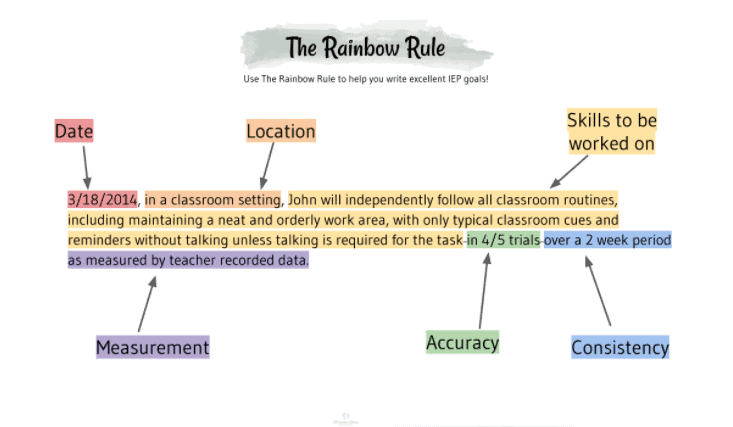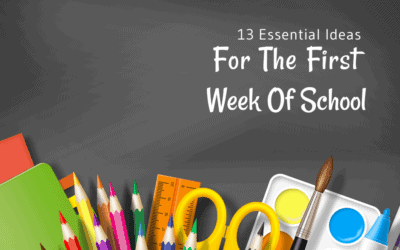One of the biggest challenges that special education teachers face is writing IEP goals that really target the student’s needs, yet don’t take hours and hours of teachers’ precious time!
After years and years of writing IEP goals and mentoring teachers in creating IEPs and writing goals, I came up with my rainbow method to help write goals:

The Rainbow Rule helps you walk through any IEP for any content area and any grade level with ease!
Let’s walk through each level of the rainbow to help with writing IEP goals!
By 2/23/2022, across the school campus, when presented with a situation where Eliana must wait her turn (e.g. in a conversation, playing with peers, etc.). Eliana will appropriately wait (e.g. wait for an appropriate time to ask a question, wait for her turn in a game, etc.) without displaying interfering behaviors (e.g. calling out, rude comments, etc.) in 4 out of 5 opportunities for 4 weeks as measured by data collection and observation record.
Let’s break this down!
Date:
By 2/23/2022
The date for the IEP goal is generally one year from when the goal is written. Sometimes, if an IEP goal is written in-between the annual IEPs, the goal may be designed for shorter than the year. This is the end date of the goal and must be reviewed by this date.
Location:
across the school campus
Oftentimes teachers forget this section and even more often it is just added in as an afterthought. I strongly believe that each part of an IEP goal is important, and will be be powerful in individualizing an IEP goal. Goals can be written for one-to-one, small group, unstructured playtime, large group, etc. This will make big differences when individualizing the goal.
Skills to work on:
when presented with a situation where Susan must wait her turn (e.g. in a conversation, playing with peers, etc.), Susan will appropriately wait (e.g. wait for an appropriate time to ask a question, wait for her turn in a game, etc.) without displaying interfering behaviors (e.g. calling out, rude comments, etc.)
Hints for writing the skills:
- Be as specific as possible
- Use lots of examples
- Try not to put multiple skills in one goal
Accuracy:
in 4 out of 5 opportunities
This is used to identify how “correct” they need to be to meet the goal. This does NOT mean this is how many times they will work on the skill. This is more for measurement purposes and less for instructional use.
Consistency:
for 4 weeks
This is an important section of the goal. Consistency tells us for how long we will expect the skill to be measured. If we do it for a shorter time, we may see more skills mastered but if we extend the consistency some, we can see if the skill is actually being mastered over a longer time period.
Measurement:
as measured by data collection and observation records.
This will explain what is being used to collect the data. This then in turn lets us know the progress on the IEP goal. I like to include both data collection and observations!





